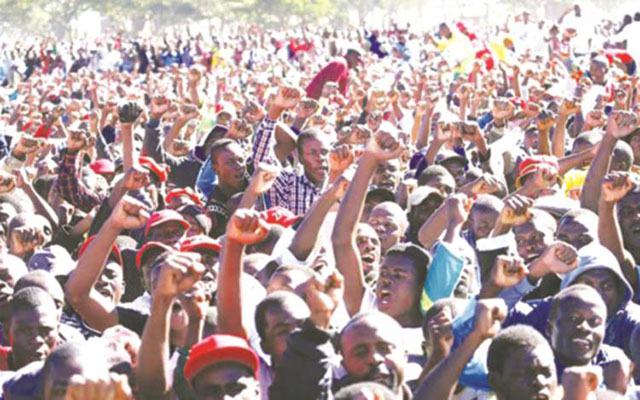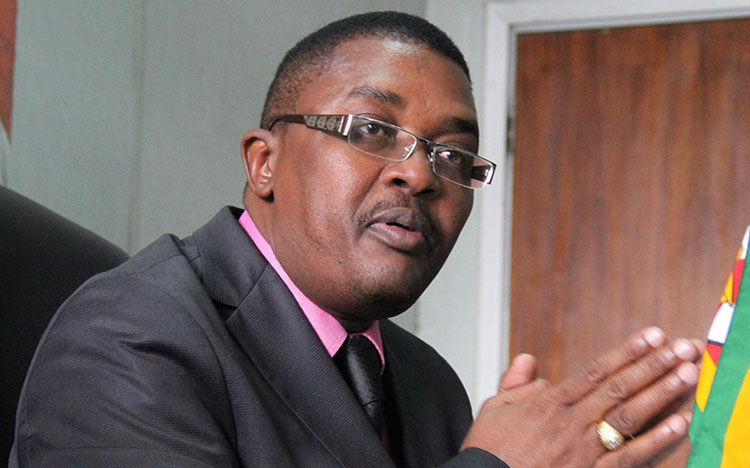Making history or repeating it – The choice is yours


Thousands of youths have been turning up for the Presidential Youth Interface Rallies as Zimbabwe gears for the 2018 elections. But getting involved is not just about turning up on election day and casting a ballot. It starts with registering to vote – a process which is ongoing right now and which everyone should embrace
Christopher Farai Charamba Features Writer
IF Nathaniel Manheru were still among us, writing that is, his weekend instalment from “The Other Side” might have begun with a quote from the Spanish-born 20th century philosopher and writer George Santayana, “those who cannot remember the past are condemned to repeat it”. It is taken from “The Life of Reason: Vol 1 – Reason in Common Sense” and has been re-uttered in various ways, an apt one applied to recent political events might be, “those who fail to learn from the mistakes of their predecessors are destined to repeat them”.
So warned was the now former Vice President Emmerson Mnangagwa in what was Manheru’s column one Saturday in December 2014 after ED – the moniker by which he is commonly known – had been elevated to the post he so recently lost alongside Vice President Phelekezela Mphoko. In an instalment titled “ED, Mphoko: Two men who need to be homeless”, Manheru wrote: “Like (King) Lear, they must learn to scoff at flattery, or its opposite equivalent, false excoriation, to embrace a larger world they are now being called upon to serve . . .
“Most of all, they must know what their predecessors were guilty of, and the list is very simple. Serving imperialism, disloyalty, divisive factional narrowness, tribalism and corruption.”
In the statement read by Information Minister SK Moyo alerting the nation to former VP Mnangagwa’s dismissal it stated that he had been discharged for exhibiting traits of “disloyalty, disrespect, deceitfulness and unreliability”. Much of the same that Manheru had warned against. Manheru would add in his message to the two VPs: “It cannot be about factions. It cannot be about white interests, about Americans or British. It has to be about three cardinal things: Zimbabwe, Zimbabwe, Zimbabwe.
“That big, impregnable cosmos, far bigger than home, than that little cottage. ED, Mphoko, the time has come to be homeless. Please don’t go home, go for big beauty, for big grandeur. Go to Zimbabwe.”
It is certainly the opinion of his former principal that ED did not “go for big beauty” and subsequently the pleasure of the President at which he served was no longer extended to him.
Many have offered opinion and commentary on the turn of events and one is certain that there shall be more think pieces, speculation and wild rumour to come in the following weeks particularly around who will replace ED and what direction Zanu-PF will take going forward. While all this is important, certainly to some more than others, one thing that should be on the mind of all is the last piece of advice that Manheru gave to the VPs, that whatever happens next has to be about Zimbabwe.
As the 2018 harmonised elections approach this is the perfect opportunity for Zimbabweans to consider what it means to put the country first and what sort of country they wish to reside in. Elections are the one time every five years that all adult Zimbabweans have a chance to make a political decision. That decision will determine the direction that the country will take for the next five years.
The ideal scenario is for people to make informed decisions, interrogate the capacity of the candidates, weigh the options against each other and then come down to settle on one. But we do not reside in Utopia and the ideal is not often the reality. Voters are more inclined to respond along party lines than consider the merit that each candidate brings to the table.
But there is an opportunity for Zimbabweans to do best for Zimbabwe. Before the country heads to the national polls parties will have to choose, at primary elections, the candidates who will represent them at each ward and constituency level. By nominating to positions, within their respective parties, the best candidate for the job this immediately raises the calibre of potential national representatives in the various halls of Government.
What should drive people’s decision in selecting candidates is the vision and the capacity of the individual to execute the grand idea of a Zimbabwe that they wish to see. This period between now and the primary elections and ultimately the national elections should be one in which the people are voicing their opinions, debating their ideas on what sort of Zimbabwe they wish to leave in looks like and who are the people who can get them there.
This is also an opportunity for young people to join the political fray by building up their networks and supporting candidates from among themselves to contest for office. They certainly have the numbers to be involved and are more likely to have the zeal to see through a vision that they helped craft. Within Zanu-PF for example, Youth League Secretary Cde Kudzi Chipanga has made it abundantly clear on many occasions that all seats, save the Presidency, are up for contestation within the party and this is an opportunity which the young must take advantage of.
It should always be remembered though that those elected into political office are representatives of the people. Their mandate is to those that have chosen them to those positions and to the State of Zimbabwe at large. Finding candidates who recognise this and are committed to the people should thus be made a priority. Zimbabweans, particularly the youth, cannot afford passivity. They cannot afford to be apathetic. Everyone needs to be fully involved in the political process because these are the ones that have a bearing on how one shall live for the next five years.
Getting involved is not just about turning up on election day and casting a ballot. It starts with registering to vote – a process which is ongoing right now and which everyone should do – but it means scrutinising the candidates within one’s party and holding them to account should they be elected into office. In another December 2014 article Manheru wrote, “history is made and moved not by supermen, but by ordinary men and women, only seized with superhuman determination”.
The question that the men and women of Zimbabwe should ask themselves is: Are they determined to make history or shall they be condemned to repeat it?










Comments